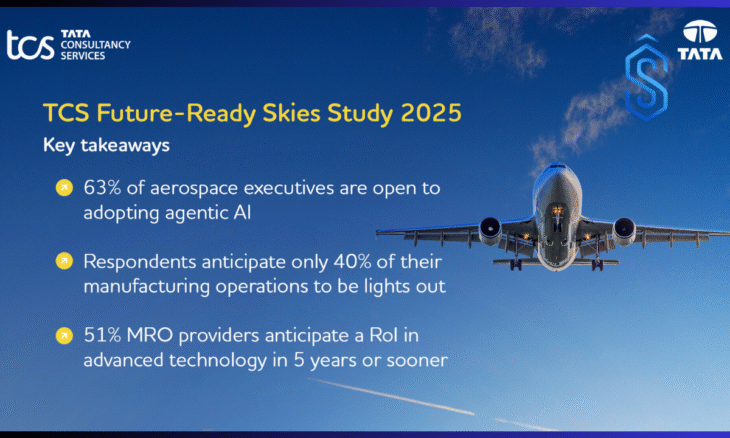Mumbai: The TCS Future Ready Skies Study 2025 by Tata Consultancy Services (TCS) (BSE: 532540, NSE: TCS) reveals that artificial intelligence (AI) and digital twins are set to redefine aerospace manufacturing, mobility, and maintenance by 2035.
The study underscores how aerospace companies are preparing for a digitally enabled future where human expertise continues to play a pivotal role alongside AI.
According to the TCS Future Ready Skies Study 2025, one in three aerospace executives believes AI-driven real-time decision-making will be the biggest catalyst of change in aircraft manufacturing.
Also Read: Tata Advanced Systems Commissions First 3D ASR Lanza-N for Indian Navy
While 60% of leaders expect human involvement to remain essential in production processes, respondents also identified robotics and digital twins as major enablers of transformation.
AI and Agentic Supply Chains Emerging from TCS Future Ready Skies Study 2025
The survey of 323 aerospace leaders, including manufacturers, MRO providers, eVTOL companies, and Advanced Air Mobility (AAM) firms across Europe and North America, highlights how companies are balancing automation with human expertise.
Nearly 63% of executives are open to deploying Agentic AI in supply chain operations, though only 6% have adopted it so far.
TCS Future Ready Skies Study 2025: Other findings include
- Only 40% of manufacturing operations are expected to be fully automated (“lights out”) in the next 5–7 years.
- 64% of respondents expect predictive analytics and agentic AI to deliver measurable ROI within five years.
- 70% of AAM companies are already building commercial platforms despite public acceptance concerns.
- Only 5% of MRO executives report their digital strategies as sufficiently scaled to meet industry needs.
- 59% of manufacturers have partially implemented digital thread integration, though end-to-end adoption remains limited.
Also Read: Godrej Aerospace Bags Major Engine Parts Contract from Pratt and Whitney
Insights from TCS Future Ready Skies Study 2025 on Industry Preparedness
The report notes that the aerospace market is on track to surpass $1 trillion by 2030, with the MRO sector alone projected at $137 billion. However, vulnerabilities persist, as just 28% of aerospace firms can pivot sourcing within 30 days of a Tier-1 supply chain disruption.
Industry leaders quoted in the study emphasized that trust in AI depends on reliable data. Steve Lucas, Chairman and CEO of Boomi, said, “Agentic AI can only succeed when built on a foundation of connected, reliable data. By integrating ecosystems, companies can accelerate decisions and scale innovation.”
Anupam Singhal, President of Manufacturing at TCS, added, “Ambition in aerospace is being redefined as AI shifts from supporting operations to shaping enterprise strategy—advancing passenger experience, safety, and sustainability.”
TCS Future Ready Skies Study 2025 Shows Aerospace Transitioning Toward Hybrid Future
The study emphasizes a hybrid future where AI enhances operations while human expertise ensures safety, precision, and adaptability. With Advanced Air Mobility expanding, eVTOL certification expected, and digital adoption accelerating, the aerospace sector is positioned for an era of intelligence, agility, and resilience.
TCS continues to partner with global aerospace leaders across OEMs, airlines, airports, MROs, and tier suppliers, offering consulting-led digital transformation solutions, including its TCS Aviana™ platform for intelligent airline operations.










